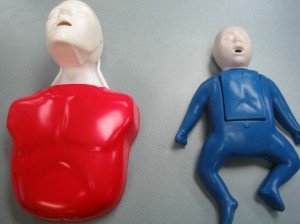Several different programs are offered at St. Mark James Training in Nanaimo, B.C. The most popular programs are focused on cardiopulmonary resuscitation (CPR) and first aid training. Cardiopulmonary resuscitation is used to get the heart to pump blood to the rest of the body during cardiac arrest. Cardiac arrest is when the heart stops beating due to a lack of blood supply to the cardiac muscle. If there is poor blood supply, that means the muscle is not receiving enough oxygen and will become damaged (which leads to loss of function). Other programs are also available with this provider, primarily in food safety/handling and other similar safety topics.

Learning CPR with First Aid Training Nanaimo
St. Mark James Training Nanaimo has over seven programs that focus on CPR. These programs have different classifications, primarily in terms of length, the age of the victim or patient, and the target audience. General public programs are available while there are programs for health care providers as well. Chest compressions, rescue breaths, and defibrillation are the basic skills that are taught in all of these CPR programs.
Standard CPR with first aid and Emergency CPR with first aid both teach the same basic curriculum to the general public: one-person CPR and first aid. However, the standard program is a 2-day program with a total of 14-16 hours in the course. Emergency courses are conducted over 1 day, in a single session. The emergency CPR program is completed over a single 6 and a half to eight-hour class. Both of these CPR programs teach students how to recognize an incident of a heart attack (cardiac arrest) of an adult victim.
Standard Child Care CPR with first aid and Emergency Child Care CPR with first aid again teaches the same topics but vary in program length. Standard Child Care is completed over two days, 16-20 hours total class hours. The emergency version of the program is completed over a single 8-hour session. Compared to the first set of CPR program, this focuses on giving CPR to children – primarily infants up to older children/younger teenagers.
Being safe in your home and workplace
Safety and awareness programs are focused on just that: being safe and aware. Safety involves both prevention and management of any injuries or health problems that can result from a hazard. Most of the programs are available on the internet as online programs while two (food safe and hydrogen sulfide) are available in house or in the training center. All certificates from online courses do not expire.
Workplace Hazardous Materials Information System (WHMIS) and Transport of Dangerous Goods (online) as usually taken in one program by trainees. The WHMIS system is used by all companies who transport hazardous materials, typically in biohazard marked containers. These symbols are used internationally, and are especially useful if ever the hazardous materials encounter an accident or ends up in a place it wasn’t supposed to.
Food safety and handling teaches trainees hygienic measures when handling any food or edible animal and plant byproduct. Food establishment and manufacturers typically request all its employees to have basic food safe certification. This program is only offered in house, with trainees receiving a certificate that does not expire (but needs to be upgraded every 5 years).
Other programs offered at St. Mark James Training Lethbridge are hydrogen sulfide awareness (H2S alive) and fire hazards.
